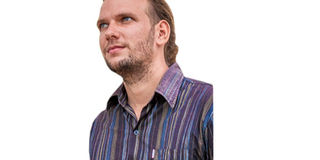Helping to enhance youth innovation

Mr Salborn, who has been in Uganda since 2006, is helping vulnerable youth attain a sustainable livelihood. Courtesy Photos
What you need to know:
- About 14 years ago, a Germany volunteer came to Uganda. Through his volunteer works, Etienne Salborn Suubi understood the challenge of orphans, many of whom would fall out of school after completing just primary education. However, through his Social Innovation Academy (SINA), Salborn has built a concept that has been able to offer vulnerable youth a variety of skills and restored hope and created employment for different youth.
What does SINA do exactly?
Basically, we help youth to gain skills that help them to start their own enterprises. We mainly congregate through boot-camps to share ideas which are sieved and there after drafted into some of our programmes and molded into meaningful enterprises.
Do you only work with vulnerable youth?
Our scope is wide but for obvious reasons, our focus is mainly on vulnerable youth because we want to empower them.
How do you connect with them?
Majority come to us through referrals. We have many organisations within the country that work with youth. Some of these organisations identify vulnerable but innovative youth who are sent to us for molding.
We also get in contact with vulnerable youth through open and online application. All the applicants and referrals are subjected to a day-long cocktail of activities through which we understand their characters, motivation and background. It’s from this stage that we select those we retain for skilling.
How many have you been able to train so far?
We have three camps, one in Mpigi and the others in Nakivale Refugee Camp and Bidibidi Refugee Camp. From the three sites, we have been able to train a combined total of 270 youth.
We are also in the process of opening another community site in Nsambya, Kampala.

Innovation and enterprise forms the largest component of skills imparted among youth at the Social Innovation Academy.
Do you have any business enterprises that have been birthed out of SINA?
At least 30 people have gone on to start small enterprises while others have found jobs because of the skills that we offer to them.
Not everyone we skill becomes an entrepreneur. Some find jobs while others fall off because of various challenges.
Some have even enrolled into further studies from where they have gone on to get great jobs.
And how do you as SINA benefit from all this?
Our aim is to unbundle youth potential and to support them to become self-sustaining. We are partly donor-funded and it is through this funding that we have been able to skill as well as fund the establishment of some enterprises. Sincerely, our satisfaction is delivered from seeing our youth start an enterprise that can employ one or two Ugandans.
This seems to be a big responsibility. How much do you spend on each youth?
It depends. At least on average, every youth gets one and a half years of training. However, there are those that need more than one and half years. For instance, on the Mpigi site alone, we have an annual budget of $50,000 (Shs185m). But in refugee camps, the average we spend is about Shs3m per month.
Do you have any other operations outside Uganda?
For now we are only in Uganda but looking to start in Zimbabwe, Kenya and DR Congo this year. We want to reach as many vulnerable communities as possible and it is for this that we are seeking to spread our wings outside Uganda.
Which are some of the challenges you encounter in running this academy?
There is always a lot of mindset challenge. For instance, many people in Uganda have this belief that if I have not gone to a university it is the end of the road.
Some people we have previously helped had may be studied something at a certain point. So they have this belief that they have arrived.
Therefore, changing the mindset of such to switch to a situation where they have to be encouraged to take on a skill like carpentry is not easy.
But beyond this is the issue of resources. Sometimes we want to take on more youth but we cannot afford them. Therefore, we don’t have sufficient funds to recruit more youth into our skilling programmes.
How long have you been in Uganda?
I come from Berlin, Germany. I have been here since 2006. After I had completed school, I straight away came to Uganda to do some volunteer works. I have not, save for routine family visits, returned since.




